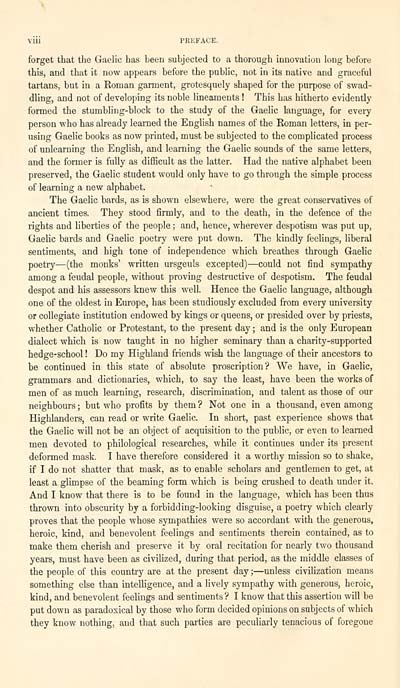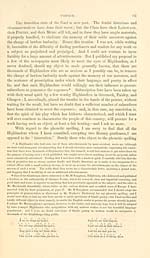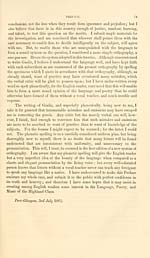Download files
Complete book:
Individual page:
Thumbnail gallery: Grid view | List view

forget that the Gaelic has been subjected to a thorough iunovatiou long before
this, and that it now appears before the public, not in its native and graceful
tartans, but in a Roman garment, grotesquely shaped for the purpose of swad-
dling, and not of developing its noble lineaments ! This has hitherto evidently
foixned the stumbling-block to the study of the Gaelic language, for every
person who has already learned the English names of the Roman letters, in per-
using Gaelic books as now printed, must be subjected to the complicated process
of unlearning the English, and learning the Gaelic sounds of the same letters,
and the former is fully as difficult as the latter. Had the native alphabet been
preserved, the Gaelic student would only have to go through the simple process
of learning a new alphabet.
The Gaelic bards, as is shown elsewhere, were the great conservatives of
ancient times. They stood firmly, and to the death, in the defence of the
rights and liberties of the people ; and, hence, wherever despotism was put up,
Gaelic bards and Gaelic poetry were put down. The kindly feelings, liberal
sentiments, and high tone of independence which breathes through Gaelic
poetry — (the monks' written ursgeuls excepted) — could not find sympathy
among a feudal people, without proving destructive of despotism. The feudal
despot and his assessors knew this well. Hence the Gaelic language, although
one of the oldest in Europe, has been studiously excluded from every university
or collegiate institution endowed by kings or queens, or presided over by priests,
whether Catholic or Protestant, to the present day ; and is the only European
dialect which is now taught in no higher seminary than a charity-supported
hedge-school ! Do my Highland friends wish the language of their ancestors to
be continued in this state of absolute proscription? We have, in Gaelic,
grammars and dictionaries, which, to say the least, have been the works of
men of as much learning, research, discrimination, and talent as those of our
neighbours ; but who profits by them ? Not one in a thousand, even among
Highlanders, can read or write Gaelic. In short, past experience shows that
the Gaelic will not be an object of acquisition to the public, or even to learned
men devoted to philological researches, while it continues under its present
deformed mask. I have therefore considered it a worthy mission so to shake,
if I do not shatter that mask, as to enable scholars and gentlemen to get, at
least a glimpse of the beaming form which is being crushed to death under it.
And I know that there is to be found in the language, which has been thus
thrown into obscurity by a forbidding-looking disguise, a poetry which clearly
proves that the people whose sympathies were so accordant with the generous,
heroic, kind, and benevolent feelings and sentiments therein contained, as to
make them cherish and preserve it by oral recitation for nearly two thousand
years, must have been as civilized, during that period, as the middle classes of
the people of this country are at the present day ; — unless civilization means
something else than intelligence, and a lively sympathy with generous, heroic,
kind, and benevolent feelings and sentiments? I know that this assertion will be
put down as paradoxical by those who form decided opinions on subjects of which
they know nothing, and that such parties are peculiarly tenacious of foregone
this, and that it now appears before the public, not in its native and graceful
tartans, but in a Roman garment, grotesquely shaped for the purpose of swad-
dling, and not of developing its noble lineaments ! This has hitherto evidently
foixned the stumbling-block to the study of the Gaelic language, for every
person who has already learned the English names of the Roman letters, in per-
using Gaelic books as now printed, must be subjected to the complicated process
of unlearning the English, and learning the Gaelic sounds of the same letters,
and the former is fully as difficult as the latter. Had the native alphabet been
preserved, the Gaelic student would only have to go through the simple process
of learning a new alphabet.
The Gaelic bards, as is shown elsewhere, were the great conservatives of
ancient times. They stood firmly, and to the death, in the defence of the
rights and liberties of the people ; and, hence, wherever despotism was put up,
Gaelic bards and Gaelic poetry were put down. The kindly feelings, liberal
sentiments, and high tone of independence which breathes through Gaelic
poetry — (the monks' written ursgeuls excepted) — could not find sympathy
among a feudal people, without proving destructive of despotism. The feudal
despot and his assessors knew this well. Hence the Gaelic language, although
one of the oldest in Europe, has been studiously excluded from every university
or collegiate institution endowed by kings or queens, or presided over by priests,
whether Catholic or Protestant, to the present day ; and is the only European
dialect which is now taught in no higher seminary than a charity-supported
hedge-school ! Do my Highland friends wish the language of their ancestors to
be continued in this state of absolute proscription? We have, in Gaelic,
grammars and dictionaries, which, to say the least, have been the works of
men of as much learning, research, discrimination, and talent as those of our
neighbours ; but who profits by them ? Not one in a thousand, even among
Highlanders, can read or write Gaelic. In short, past experience shows that
the Gaelic will not be an object of acquisition to the public, or even to learned
men devoted to philological researches, while it continues under its present
deformed mask. I have therefore considered it a worthy mission so to shake,
if I do not shatter that mask, as to enable scholars and gentlemen to get, at
least a glimpse of the beaming form which is being crushed to death under it.
And I know that there is to be found in the language, which has been thus
thrown into obscurity by a forbidding-looking disguise, a poetry which clearly
proves that the people whose sympathies were so accordant with the generous,
heroic, kind, and benevolent feelings and sentiments therein contained, as to
make them cherish and preserve it by oral recitation for nearly two thousand
years, must have been as civilized, during that period, as the middle classes of
the people of this country are at the present day ; — unless civilization means
something else than intelligence, and a lively sympathy with generous, heroic,
kind, and benevolent feelings and sentiments? I know that this assertion will be
put down as paradoxical by those who form decided opinions on subjects of which
they know nothing, and that such parties are peculiarly tenacious of foregone
Set display mode to: Large image | Transcription
Images and transcriptions on this page, including medium image downloads, may be used under the Creative Commons Attribution 4.0 International Licence unless otherwise stated. ![]()
| Early Gaelic Book Collections > Blair Collection > Treatise on the language, poetry, and music of the Highland clans > (12) |
|---|
| Permanent URL | https://digital.nls.uk/76236535 |
|---|
| Description | A selection of books from a collection of more than 500 titles, mostly on religious and literary topics. Also includes some material dealing with other Celtic languages and societies. Collection created towards the end of the 19th century by Lady Evelyn Stewart Murray. |
|---|
| Description | Selected items from five 'Special and Named Printed Collections'. Includes books in Gaelic and other Celtic languages, works about the Gaels, their languages, literature, culture and history. |
|---|

